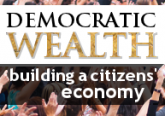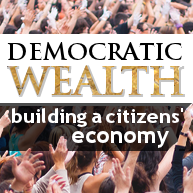We live in societies with economies nested within them, nested in turn in the non-human world. A green republican conception of political economy recognises this reality, and challenges the priority given to growth.
‘The most alarming sign of the state of our society now is that our leaders have the courage to sacrifice the lives of young people in war but not the courage to tell us that we must be less greedy and less wasteful.’ Wendell Berry, 1994, p.92.
As Philip Pettit argues in his contribution to this series, republicans see the economy as a politically created arena of human activity, with an associated institutional infrastructure (such as the legal codes, tort, property rights, legal framework for economic enterprises, legal rules governing trade and exchange, etc.). It is neither ‘self-regulating’ or beyond legitimate political and democratic regulation and, where necessary, interference. Republicans do not see a difficulty with interfering with market relations for important non-economic, political reasons, such as to preserve civic freedoms, promote solidarity or shared common goods. They are concerned with ensuring the market is confined to its appropriate sphere, and that the ‘economics imperialism’ and the colonising effects of the market are limited, but without completely abolishing the market.
A green republican conception of political economy, however, is one that also begins its analysis from the observation that we live in societies with economies nested within them. Not the other way around. And both human economies and societies are themselves located within and completely dependent upon the non-human world.
Departing from liberalism in a radical manner, a green republican perspective on the economy is therefore interested not simply in the efficiency or productivity of economic relations. Nor is it simply interested in economic growth at any costs. Indeed, it rejects the conventional priority given to undifferentiated economic growth for at least three reasons.
Natural limits to growth
The first is in terms of the standard ecological argument first proposed by the ‘limits to growth’ thesis of the early 1970s. This is the argument that it is biophysically impossible for the economy to continually grow year on year, consuming more and more resources and energy, producing more goods and services and consequent pollution. There is simply not enough planet for all societies to have economies that growth indefinitely. Yet this is precisely what capitalism requires, on average, a growth rather of less that 3% per year constitutes a crisis for this particular way of organising the economy. Capitalism, from this first argument against economic growth, is like a bicycle, the economy either grows (moves forward) or it falls over. That is, ‘boom and bust’ are intrinsic features of the capitalist economy, not aberrations, as astute observers of capitalism such as Marx and others such as Joseph Schumpeter recognised in his analysis of the centrality of the ‘business cycle’ for a normally functioning capitalist economy.
Inequality is the problem
The second reason is a non-ecological argument in terms of the rise in socio-economic inequalities caused by policies promoting economic growth under capitalism. The problems in rich societies such as most of those in Europe is not, heretical as this is to say, caused by these societies somehow not being wealthy enough (and therefore requiring more GDP growth, and the associated promotion and veneration of ‘wealth creators’ and establishing ideological divisions within society between ‘shirkers and strivers’ etc.). Rather the problem from the point of view of tackling inequalities and the problems stemming from them is … well inequality. Here we begin to get at the heart of the issue of what’s wrong with the dominant ‘commonsense’ view of undifferentiated, economic growth as a permanent or desirable feature of the economy (Barry, 2012).
While there are sound arguments that can be made for pro-poor growth and less inegalitarian growth, it is also the case that viewing economic growth as a non-negotiable imperative also serves to deflect arguments for greater redistribution of wealth, income, work (including employment) and opportunities. Here a green republican alternative to economic growth would be something like ‘economic security’ as defined by the International Labor Organization, in its 2004 publication, Economic Security for a Better World.
People in countries that provide citizens with a high level of economic security have a higher level of happiness on average, as measured by surveys of national levels of life-satisfaction and happiness . . . The most important determinant of national happiness is not income level—there is a positive association, but rising income seems to have little effect as wealthy countries grow more wealthier. Rather the key factor is the extent of income security, measured in terms of income protection and a low degree of income inequality. (International Labour Organization, 2004: 1; emphasis added)
Growth and human flourishing
A third reason for questioning economic growth is that as a means to an end, green republicans focus on the threshold beyond which the pursuit of economic growth does not add to human flourishing, or a healthy democratic polity, and associated forms of active citizenship and the civic fabric of a free society. While orthodox economic growth can clearly improve life chances in the context of a low level of material development, not least if accompanied by explicitly pro-poor and distributive policies, there comes a point beyond which the continued pursuit of such growth begins to undermine human flourishing.
As Wilkinson and Pickett put it, ‘Economic growth, for so long the great engine of progress, has, in the rich countries, largely finished its work. Not only have measures of well-being and happiness ceased to rise with economic growth but, as affluent societies have grown richer, there have been long-term rises in rates of anxiety, depression, and numerous other social problems. The populations of rich countries have got to the end of a long historical journey’ (Wilkinson and Pickett, 2009: 5–6).
Indeed, we have enough evidence that orthodox economic growth, and the policy prescriptions designed to create and sustain it, from ‘active labour market’ policies, the reduction of education to employability skills, the race to the bottom logic of having to become ‘globally competitive’ etc. beyond a threshold undermines human well-being, is corrosive of community cohesion and social solidarity. Thus, the argument here is not some ideological ‘no economic growth’ position (though doubtless is how it will be presented by many on both left and right). Rather it is one that suggests there comes a point where in answering the political economy question ‘what the economy is for?’ involves identifying (however roughly and imperfectly) the threshold beyond which economic growth becomes, as ecological economist Herman Daly provocatively puts it, ‘uneconomic growth’. For this reason we need to remember that while the end or limiting of economic growth is a major problem for capitalism, this does not automatically translate into this being a problem for individuals or communities. But only if, as suggested here, we adopt the invitation of a green republican political economy perspective, and begin to politically and creatively imagine ‘economic policy’ beyond ‘neoclassical economics’; the ‘economy’ beyond the ‘market’; and ‘work’ beyond ‘employment’.
We can only do this, however, if we take a step back and see that what we need most fundamentally is a return to ‘political economy’ in its deepest sense: that is, a rejection of the notion that the economy is a non-political, technical and expert realm of human experience and public policy. And here we need to ask ourselves a very republican question: why, when democratic politics is based on the important but simple idea that there are a variety of ways to organise the polity and governance structures etc., would we accept that there is only one way (capitalism) or one public policy objective (economic growth) to organize and judge the economy? And more particularly why, given some of reasons sketched above, are we committed to orthodox, undifferentiated economic growth as a permanent feature of the economy as opposed to a phase leading to ‘post-growth’ or other forms of more differentiated growth possibilities? Or different, democratically agreed and politically framed objectives by which we judge the ‘success’ of our economy?
This article is part of the Democratic Wealth series, hosted by Politics in Spires in partnership with OurKingdom.





No Comment